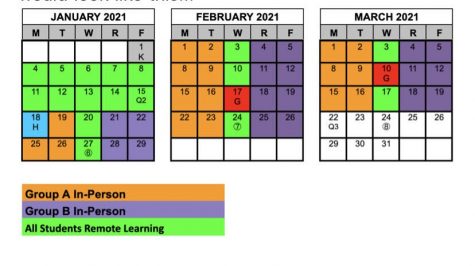Sophomores Taking the ACT
Administrators take ACTion on the sophomore ACT.
This is the first year BEHS sophomores will be taking the ACT.
The sophomore’s are taking the ACT April 24. The process to get the sophomores to take the ACT has been happening for a long time. The results of the sophomores taking the ACT will affect their classes and scheduling.
The juniors have taken an ACT funded by the state, not only as a requirement, but to help students become college ready. At the end of last school year, a new state requirement has sophomores also taking the ACT. This year will be the first year that sophomores will take it. The hope is that sophomores can get a headstart on meeting benchmarks, 18 for English, 19 for mathematics and 20 for reading. The junior ACT for this year was over a month before the sophomores, the juniors took it March 12 and the sophomores will be taking it April 24. There are positives and negatives to sophomores taking it over a month later.
“There was a deadline, created by ACT, to register to allow both sophomores and juniors to take on the same day. This deadline passed, however ACT still granted high schools an opportunity to test sophomores but on a later date. Keep in mind there are positive and negatives to both (same day vs. different day). Same day allows a ‘one stop shop’ approach, having everyone tested at the same time. A drawback, which is a positive for split, are the tools and supports for all students to be successful. For example, the number of calculators available may not meet the needs of all sophomore and juniors, as you can’t change the order of the ACT. Also, getting all student equal access through intentional support is challenging when this happens on the same day. In summary, looking at this depends if you look at the glass half empty or half full,” said Director of Secondary Education Rachelle Bramlage.
English teacher Larry Steinmetz first suggested that sophomores take the ACT a few years ago. Earlier this year he was able to get the idea to Principal Chris Mason who in turn pitched the idea to Bramlage. After figuring out how to pay for it and a date for the sophomores to take it, the date was confirmed in January due to figuring out how to fund it. The state isn’t funding it this year, and it is unknown if whether or not they will fund it next year. Steinmetz wanted to get a head start to helping students meet benchmarks and become more college and career ready.
“We have too many kids who take the ACT for the first time when they are juniors. That is our largest part of our school accountability is that junior ACT so it is silly for us not to be proactive and go on and find out where these kids stand and give them a year or two in advance for efficiency. I’m really proud that the district has stepped up and found the money to make that a reality,” said Steinmetz.
While it has taken a while to get the sophomore ACT finalized, the overall help that it will offer will be worth the current sophomores, along with future sophomores, to take it. It will give sophomores practice being in the testing situation and help them get a base score to know how they need to improve. If the sophomores don’t meet benchmarks, then they will be put in a class to help improve their score junior year instead of waiting until senior year to do the remediation. Since they will be taking it junior year anyway, the students won’t have to pay for it like they would have to if remediation was prolonged to senior year. If they don’t meet benchmarks junior year than they still have time to get the score up senior year. Bramlage uses an analogy to explain it.
“I am going to use running as my analogy. I am not an avid runner. Therefore, I can’t get up and run a marathon or better yet a mini-marathon without training. Technically, no one can unless you train. This is the same case for the ACT. Typically, students are not as successful on their first attempt when taking the ACT since they have not been exposed to the testing environment. Plus, there is research out there supporting the more students are exposed to the testing environment of the ACT, the better he/she performs. Keep in mind, we have some students and families who can afford to take the ACT multiple times. If a student has this monetary support at home and has taken the ACT prior to their Junior year, that student does better. However, not all of our students have the same access. Therefore, we want to pay for it to allow everyone equitable access and increase the odds of a student doing better,” said Bramlage.
Steinmetz also believes that the sophomores taking it will have a positive impact on student ACT scores. He believes that the juniors taking it in advance will come to the students’ benefit. “I think that the nice thing is that the juniors are essentially going to take it a month before the sophomores so that kind of puts it on their [sophomores] radar. Then they will know that it’s coming up. We did counselling sessions with kids and we were really careful to go over transition math and remedial english for ACT prep and making them understand that this ACT matters. For their placement and their freedom to go and pick some of the classes they want to take next year. I’m not really worried about it being hectic. I think the kids have goals in front of them and a purpose in front of them.”
Other teachers think that this test will come to the students benefit. Math teacher Kristen Stobaugh believes that this test will benefit the majority of the students. “I think that the majority of our kids will put forth effort that makes it worth it. Will there always be people that will not make their best effort? Yes, but I don’t think that’s who we should make our decisions based on. I think we should make it based on the kids who are trying.”
English teacher Leo Craven is also supporting the sophomores taking the ACT this April. He believes that it will positively affect the students and help boost the amount of students that become college and career ready. While Craven sees the benefits, he also believes that this is causing Bullitt East to become more college than career ready and make a greater focus on standardized testing. Bramlage thinks the opposite. “It may feel this way. However, ACT is the determining factor for Proficiency for High School. Until that changes, ACT is a required assessment. On a different note, BEHS is still continuing to grow its pathway options to students. Gaming was recently discussed as an additional pathway. Mr. Steinmetz is looking to add a potential pathway embedded in Journalism and Yearbook. Again, it may feel this way, but I assure you BEHS is continuing to explore options for students to become Transition Ready, as there is not and will never be a one size fits all approach,” said Bramlage.








